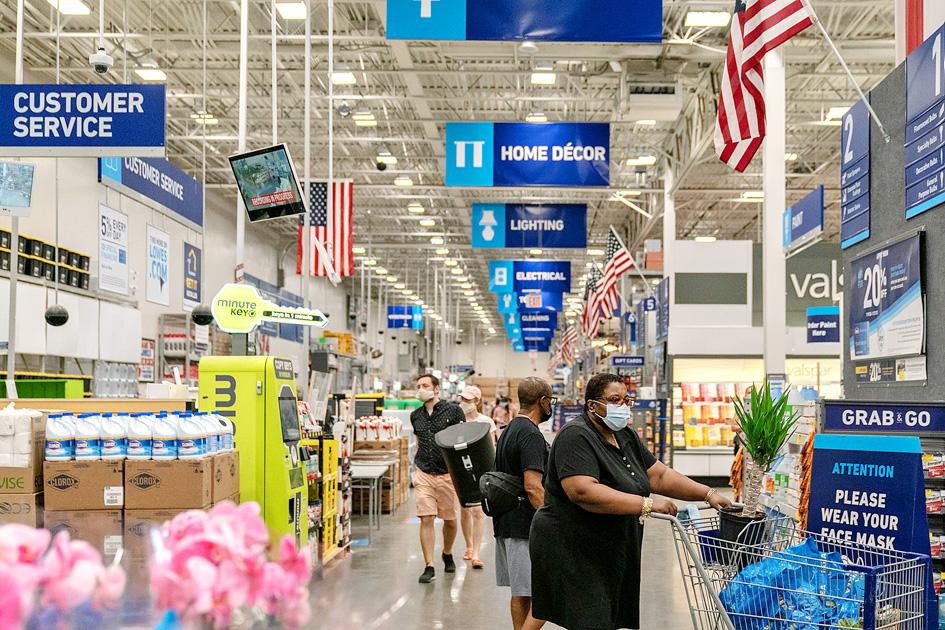Many retailers have been caught off-guard by COVID-19 restrictions and shifting consumer habits, but do-it-yourself (DIY) stores are enjoying a boom as people spend money on their homes and gardens.
A report by consulting group McKinsey & Co found that faced with a prolonged period of financial uncertainty due to the COVID-19 pandemic, consumers “intend to continue shifting their spending largely to essentials ... and cutting back on most discretionary categories.”
Consumers worldwide are cutting back on clothing and shoes, but spending more to improve their homes, the report said.

Photo: Bloomberg
In the UK, the sector has helped consumer spending overall to rebound to a level higher than before the pandemic hit.
“Spending for home improvements continued to rise in August as sales volumes within household goods stores increased by 9.9 percent when compared with February,” the UK Office for National Statistics said.
This should not come as a surprise, as people are spending more time at home, and even when not under lockdown, many people are working from home or have fewer public activities to participate in, the report said.
A survey carried out in 20 countries by consulting firm Accenture Ltd found that over two-thirds of respondents expect most of their social activities to take place at their home or that of friends.
The unease that many people feel in public spaces might push a lasting shift toward people spending more time at home, Accenture said, calling it a “decade of the home.”
Many Germans have used the downtime during the COVID-19 lockdown to “repair, refurbish and decorate their homes,” the country’s BHB trade association for home improvement, building and gardening said in a report.
Sales in the sector rose by 15.6 percent year-on-year to nearly 12 billion euros (US$139.58 billion) over the first half of this year, boosted by many DIY stores and garden centers being allowed to stay open during virus lockdowns.
Paint and painting accessories proved most popular, with sales climbing by 37.6 percent, BHB said, adding that garden furniture also saw a 21 percent sales jump, it said.
DIY retailers have been reporting surging sales.
Lowe’s Co, a major DIY chain in the US, saw sales rise 34.2 percent in its second quarter that ended on July 31 — a period when restrictions were still in place in some US states.
“Sales were driven by a consumer focus on the home, core repair and maintenance activities, and wallet share shift away from other discretionary spending,” Lowe’s chief executive Marvin Ellison said when announcing the results.
Kingfisher PLC, which has several DIY and home furnishing chains in France, the UK and Ireland, said that after an initial dip, sales quickly recovered and are still rising.
“The COVID-19 crisis touched our sales in the first quarter, but we saw a strong rebound in the second, a trend which is continuing in the third quarter at all of our chains and in all segments,” Kingfisher chief executive Thierry Garnier said.
Consumers have shifted a lot of their buying to online stores, a trend that is helping ManoMano SAS, an online-only French DIY retailer.
“In February, we were at 50 million euros in sales volume and in April, we were at 200 million, so you see the acceleration,” ManoMano cofounder Christian Raisson said. “We’ll more than double the 620 million euros in sales we had last year.”

South Korea’s equity benchmark yesterday crossed a new milestone just a month after surpassing the once-unthinkable 5,000 mark as surging global memory demand powers the country’s biggest chipmakers. The KOSPI advanced as much as 2.6 percent to a record 6,123, with Samsung Electronics Co and SK Hynix Inc each gaining more than 2 percent. With the benchmark now up 45 percent this year, South Korea’s stock market capitalization has also moved past France’s, following last month’s overtaking of Germany’s. Long overlooked by foreign funds, despite being undervalued, South Korean stocks have now emerged as clear winners in the global market. The so-called “artificial intelligence

‘SEISMIC SHIFT’: The researcher forecast there would be about 1.1 billion mobile shipments this year, down from 1.26 billion the prior year and erasing years of gains The global smartphone market is expected to contract 12.9 percent this year due to the unprecedented memorychip shortage, marking “a crisis like no other,” researcher International Data Corp (IDC) said. The new forecast, a dramatic revision down from earlier estimates, gives the latest accounting of the ongoing memory crunch that is affecting every corner of the electronics industry. The demand for advanced memory to power artificial intelligence (AI) tasks has drained global supply until well into next year and jeopardizes the business model of many smartphone makers. IDC forecast about 1.1 billion mobile shipments this year, down from 1.26 billion the prior

Chinese artificial intelligence (AI) start-up DeepSeek’s (深度求索) latest AI model, set to be released as soon as next week, was trained on Nvidia Corp’s most advanced AI chip, the Blackwell, a senior official of US President Donald Trump’s administration said on Monday, in what could represent a violation of US export controls. The US believes DeepSeek will remove the technical indicators that might reveal its use of American AI chips, the official said, adding that the Blackwells are likely clustered at its data center in Inner Mongolia, an autonomous region of China. The person declined to say how the US government received

People stand in a Pokemon store in Tokyo on Thursday. One of the world highest-grossing franchises is celebrated its 30th anniversary yesterday.